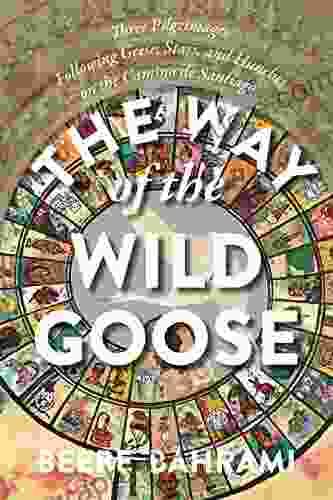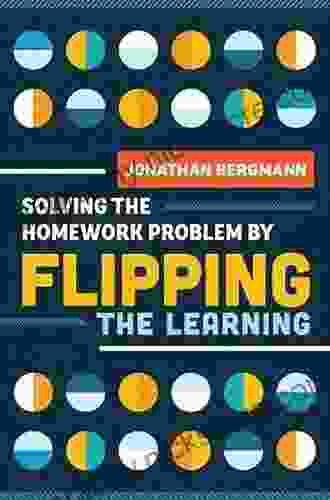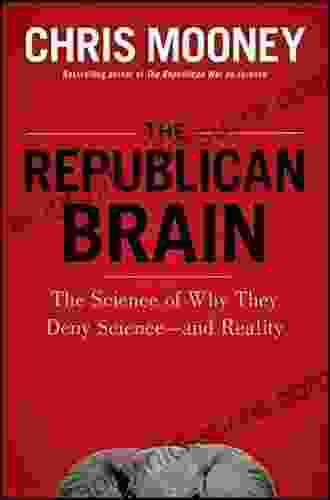The Science of Why They Deny Science and Reality

4.4 out of 5
| Language | : | English |
| File size | : | 1011 KB |
| Text-to-Speech | : | Enabled |
| Screen Reader | : | Supported |
| Enhanced typesetting | : | Enabled |
| Word Wise | : | Enabled |
| Print length | : | 336 pages |
In an age of unprecedented scientific progress, it may seem puzzling that some people continue to deny the overwhelming consensus of scientists on issues like climate change, evolution, and the safety of vaccines. This phenomenon, known as science denial, is a complex and multifaceted issue with a variety of causes.
In this article, we will explore the science behind science denial. We will examine the psychological, social, and political factors that contribute to this phenomenon, and discuss the implications of science denial for society.
The Psychological Factors of Science Denial
One of the most important factors that contribute to science denial is psychological. People are more likely to deny scientific evidence that contradicts their existing beliefs, values, and identities. This is because science denial can serve as a way to protect our self-concept and maintain our sense of belonging to a particular group.
For example, people who identify as conservatives are more likely to deny climate change, even when presented with overwhelming evidence of its existence. This is because climate change is often seen as a threat to conservative values, such as individualism and free-market capitalism.
Similarly, people who are religious are more likely to deny evolution, even though evolution is a well-supported scientific theory. This is because evolution is often seen as a threat to religious beliefs, such as the belief in a divine creator.
In addition to these group-level factors, there are also individual-level psychological factors that can contribute to science denial. For example, people who are high in need for cognition are more likely to be open to new information and to accept scientific evidence. Conversely, people who are low in need for cognition are more likely to be closed-minded and to reject scientific evidence that contradicts their existing beliefs.
The Social Factors of Science Denial
In addition to psychological factors, social factors can also play a role in science denial. People are more likely to deny scientific evidence if they are surrounded by others who also deny it. This is because social support can make it easier to maintain our beliefs, even when they are not supported by evidence.
For example, people who live in communities where climate change is not widely accepted are more likely to deny climate change themselves. This is because they are surrounded by others who share their beliefs, which makes it easier for them to dismiss the evidence that contradicts those beliefs.
Similarly, people who work in fields where science is not widely respected are more likely to deny scientific evidence. This is because they are surrounded by others who do not value science, which makes it easier for them to dismiss scientific evidence that contradicts their own beliefs.
The Political Factors of Science Denial
Political factors can also play a role in science denial. Politicians and other public figures often use science denial to advance their own agendas. For example, some politicians have denied climate change in order to avoid taking action on this issue. Similarly, some religious leaders have denied evolution in order to maintain their authority over their followers.
Political science denial can have a devastating impact on society. When politicians and other public figures deny scientific evidence, it undermines public trust in science and makes it more difficult to address important issues like climate change and public health.
The Implications of Science Denial
Science denial has a number of negative consequences for society. First, it can lead to poor decision-making. When people deny scientific evidence, they are more likely to make decisions that are not in their best interests. For example, people who deny climate change are more likely to support policies that will exacerbate climate change, such as increased reliance on fossil fuels.
Second, science denial can lead to social division. When people deny scientific evidence, they are more likely to disagree with others who accept that evidence. This can lead to social conflict and division.
Third, science denial can undermine public trust in science. When people see that scientific evidence is being denied by politicians and other public figures, they are more likely to lose trust in science. This can make it more difficult for scientists to communicate their findings to the public, and it can make it more difficult for the public to make informed decisions about important issues.
Science denial is a complex and multifaceted phenomenon with a variety of causes. Psychological, social, and political factors can all contribute to this phenomenon. Science denial has a number of negative consequences for society, including poor decision-making, social division, and undermined public trust in science. It is important to understand the science behind science denial in order to address this phenomenon and its negative consequences.
4.4 out of 5
| Language | : | English |
| File size | : | 1011 KB |
| Text-to-Speech | : | Enabled |
| Screen Reader | : | Supported |
| Enhanced typesetting | : | Enabled |
| Word Wise | : | Enabled |
| Print length | : | 336 pages |
Do you want to contribute by writing guest posts on this blog?
Please contact us and send us a resume of previous articles that you have written.
 Fiction
Fiction Non Fiction
Non Fiction Romance
Romance Mystery
Mystery Thriller
Thriller SciFi
SciFi Fantasy
Fantasy Horror
Horror Biography
Biography Selfhelp
Selfhelp Business
Business History
History Classics
Classics Poetry
Poetry Childrens
Childrens Young Adult
Young Adult Educational
Educational Cooking
Cooking Travel
Travel Lifestyle
Lifestyle Spirituality
Spirituality Health
Health Fitness
Fitness Technology
Technology Science
Science Arts
Arts Crafts
Crafts DIY
DIY Gardening
Gardening Petcare
Petcare James Randi
James Randi Chuck Missler
Chuck Missler Cait Stevenson
Cait Stevenson Mark Ellyatt
Mark Ellyatt James Syhabout
James Syhabout Leslie Stager
Leslie Stager Stephen K Sanderson
Stephen K Sanderson Hongyu Guo
Hongyu Guo R L Medina
R L Medina Ellen Lewin
Ellen Lewin Jake Anderson
Jake Anderson Trish Kuffner
Trish Kuffner Graham R Gibbs
Graham R Gibbs Catherine J Allen
Catherine J Allen Steve Burrows
Steve Burrows Mackenzi Lee
Mackenzi Lee Wayne B Chandler
Wayne B Chandler Daniel M Koretz
Daniel M Koretz Max Marchi
Max Marchi Grey Owl
Grey Owl Jesse Liberty
Jesse Liberty Julie L Spencer
Julie L Spencer Cary J Griffith
Cary J Griffith Nick Townsend
Nick Townsend Bryan Peterson
Bryan Peterson Suzanne Wylde
Suzanne Wylde Pat Shipman
Pat Shipman Lewis Thomas
Lewis Thomas William Byers
William Byers Pavla Kesslerova
Pavla Kesslerova Farley Mowat
Farley Mowat Charlie Shamp
Charlie Shamp Emma Walker
Emma Walker Karen Bush
Karen Bush Lily Collins
Lily Collins Erica B Marcus
Erica B Marcus Mike High
Mike High John G Robertson
John G Robertson Tim Ingold
Tim Ingold V B Alekseev
V B Alekseev Daniel P Huerta
Daniel P Huerta Paul Van Lierop
Paul Van Lierop Rob Hutchings
Rob Hutchings Paul Doiron
Paul Doiron Hollis Lance Liebman
Hollis Lance Liebman Achille Rubini
Achille Rubini Kam Knight
Kam Knight Khurshed Batliwala
Khurshed Batliwala Margaret Owen
Margaret Owen Mia Scotland
Mia Scotland Emily Chappell
Emily Chappell Becca Anderson
Becca Anderson Melissa Haag
Melissa Haag Linnea Dunne
Linnea Dunne Arny Alberts
Arny Alberts Hunbatz Men
Hunbatz Men Dustin Salomon
Dustin Salomon Diane Yancey
Diane Yancey Meghan L Marsac
Meghan L Marsac Basu Shanker
Basu Shanker Gerald Beaudry
Gerald Beaudry John D Barrow
John D Barrow Barzin Pakandam
Barzin Pakandam Clifford Herriot
Clifford Herriot Barry Rabkin
Barry Rabkin Deanna Roy
Deanna Roy Scott Reed
Scott Reed John C Norcross
John C Norcross Dave Rearwin
Dave Rearwin Richard J Dewhurst
Richard J Dewhurst Frederick Douglass Opie
Frederick Douglass Opie Mike Allison
Mike Allison Fred Mitchell
Fred Mitchell David Klausmeyer
David Klausmeyer Alastair Hannay
Alastair Hannay Stanislas Dehaene
Stanislas Dehaene Stephen J Bavolek
Stephen J Bavolek Diane Cardwell
Diane Cardwell Rob Rains
Rob Rains Eric Franklin
Eric Franklin Dr Michael P Masters
Dr Michael P Masters Kenneth Wilgus Phd
Kenneth Wilgus Phd Dr Craig Malkin
Dr Craig Malkin Joanna Hunt
Joanna Hunt Jenn Mcallister
Jenn Mcallister Daniel J Barrett
Daniel J Barrett Kindle Edition
Kindle Edition Jayanti Tambe
Jayanti Tambe Richard Scott
Richard Scott Eddie Merrins
Eddie Merrins Jean Illsley Clarke
Jean Illsley Clarke Jane Butel
Jane Butel Proper Education Group
Proper Education Group Michael Palin
Michael Palin St Louis Post Dispatch
St Louis Post Dispatch Blair Braverman
Blair Braverman Jonathan Bergmann
Jonathan Bergmann Reprint Edition Kindle Edition
Reprint Edition Kindle Edition Eric Engle
Eric Engle Stan Tekiela
Stan Tekiela Matt Taddy
Matt Taddy Gordon Witteveen
Gordon Witteveen David Taylor
David Taylor Reelav Patel
Reelav Patel Bobbie Faulkner
Bobbie Faulkner S K Gupta
S K Gupta Shayla Black
Shayla Black Charles Buist
Charles Buist Richard Chun
Richard Chun Martin Sternstein
Martin Sternstein John J Robinson
John J Robinson Donald Frias
Donald Frias Nadine Hays Pisani
Nadine Hays Pisani Sampson Davis
Sampson Davis Scott Malthouse
Scott Malthouse Thomas Bulfinch
Thomas Bulfinch Bagele Chilisa
Bagele Chilisa Elizabeth George Speare
Elizabeth George Speare Jay Abramson
Jay Abramson Casey Watson
Casey Watson Basudeb Bhatta
Basudeb Bhatta Craig Romano
Craig Romano Stefan Ecks
Stefan Ecks Nicholas Wolterstorff
Nicholas Wolterstorff John H Mcwhorter
John H Mcwhorter Richard H Immerman
Richard H Immerman Linda Carroll
Linda Carroll Ron Lemaster
Ron Lemaster Bashir Hosseini Jafari
Bashir Hosseini Jafari Ping Li
Ping Li Edith Grossman
Edith Grossman Tim Marshall
Tim Marshall Ken Xiao
Ken Xiao Gay Robins
Gay Robins Jen Houcek
Jen Houcek Ascencia
Ascencia Dan R Lynch
Dan R Lynch Luke Gilkerson
Luke Gilkerson Kyle Butler
Kyle Butler Eliza Reid
Eliza Reid Steven Hawthorne
Steven Hawthorne Victor Seow
Victor Seow Joseph Schmuller
Joseph Schmuller Simon Spurrier
Simon Spurrier Percy Boomer
Percy Boomer Robin Mcmillan
Robin Mcmillan Chris Eberhart
Chris Eberhart John Garrity
John Garrity Ryan A Pedigo
Ryan A Pedigo Cynthia Levinson
Cynthia Levinson Geert Hofstede
Geert Hofstede Richard Harris
Richard Harris F William Lawvere
F William Lawvere Oliver T Spedding
Oliver T Spedding Yuki Mano
Yuki Mano J C Cervantes
J C Cervantes Gabriyell Sarom
Gabriyell Sarom George Macdonald
George Macdonald Emma Brockes
Emma Brockes Peter Martin
Peter Martin Smart Reads
Smart Reads Charles Soule
Charles Soule Mina Lebitz
Mina Lebitz Peter Wacht
Peter Wacht Guy P Harrison
Guy P Harrison Sam Nadler
Sam Nadler Melissa Gomes
Melissa Gomes Roanne Van Voorst
Roanne Van Voorst Malcolm Hebron
Malcolm Hebron Barbara Ann Kipfer
Barbara Ann Kipfer Maha Alkurdi
Maha Alkurdi Bernard Marr
Bernard Marr Jenna Helland
Jenna Helland Mark Kurlansky
Mark Kurlansky Sharon Dukett
Sharon Dukett Ryan T White
Ryan T White Barbara Kennard
Barbara Kennard Massimo Cossu Nicola Pirina
Massimo Cossu Nicola Pirina Jennifer Pharr Davis
Jennifer Pharr Davis Richard Meadows
Richard Meadows Noah Brown
Noah Brown Chris Bennett
Chris Bennett Benita Bensch
Benita Bensch Sean Mcindoe
Sean Mcindoe Charlotte Browne
Charlotte Browne Mark H Newman
Mark H Newman Mike Swedenberg
Mike Swedenberg Baruch Englard
Baruch Englard Charlotte Booth
Charlotte Booth Violet Moller
Violet Moller Erik J Brown
Erik J Brown Marc Loy
Marc Loy Sam Cowen
Sam Cowen Brad Burns
Brad Burns John Kimantas
John Kimantas Kara Tippetts
Kara Tippetts Sam Harris
Sam Harris Shmuel Peerless
Shmuel Peerless Ryan Higa
Ryan Higa Jeffrey Jensen Arnett
Jeffrey Jensen Arnett Scott Westerfeld
Scott Westerfeld Joseph Alton M D
Joseph Alton M D Patrick Sweeney
Patrick Sweeney John Whitman
John Whitman Lynn Rosen
Lynn Rosen Ben Sedley
Ben Sedley Barry Burd
Barry Burd Robin Knox Johnston
Robin Knox Johnston Michael Wood
Michael Wood Bruce Pascoe
Bruce Pascoe Valerie Pollmann R
Valerie Pollmann R Ian Leslie
Ian Leslie Kate Darling
Kate Darling Cindy Post Senning
Cindy Post Senning Master Gamer
Master Gamer Breanna Hayse
Breanna Hayse Tami Anastasia
Tami Anastasia Richard Weissbourd
Richard Weissbourd Jeff Belanger
Jeff Belanger Betty Stone
Betty Stone Helen Kara
Helen Kara Barbara Illowsk
Barbara Illowsk Jessica Smartt
Jessica Smartt Mark Mayfield
Mark Mayfield Sara Shepard
Sara Shepard Harvey Wittenberg
Harvey Wittenberg Steven Bell
Steven Bell Rachel Dash
Rachel Dash Graham Farmelo
Graham Farmelo Chadd Vanzanten
Chadd Vanzanten Jutta Schickore
Jutta Schickore Barry Johnston
Barry Johnston Yuval Noah Harari
Yuval Noah Harari John Quick
John Quick Tori Day
Tori Day Kara Goucher
Kara Goucher Monica Hesse
Monica Hesse Gary Lincoff
Gary Lincoff Bill Milliken
Bill Milliken Laura Pavlov
Laura Pavlov Bill Mckibben
Bill Mckibben Christopher L Heuertz
Christopher L Heuertz Otto Scharmer
Otto Scharmer Rowan Jacobsen
Rowan Jacobsen David A Bogart
David A Bogart S E Hinton
S E Hinton Joshua Hammer
Joshua Hammer Babu The Panda
Babu The Panda Robin Nixon
Robin Nixon Joshua G Shifrin
Joshua G Shifrin Gary Soto
Gary Soto Jean Smith
Jean Smith Vincent Bossley
Vincent Bossley Susan Scott
Susan Scott Molly E Lee
Molly E Lee Ronald Wheeler
Ronald Wheeler Nicole Martin
Nicole Martin Scott Mactavish
Scott Mactavish Samantha Fitts
Samantha Fitts Anthony Edwards
Anthony Edwards Ralph Galeano
Ralph Galeano Steven Rinella
Steven Rinella David Jamieson Bolder
David Jamieson Bolder Susan Nance
Susan Nance Mary A Fristad
Mary A Fristad David Starbuck Smith
David Starbuck Smith Clayton King
Clayton King Rachel Smith
Rachel Smith Visual Arts
Visual Arts Rebecca Solnit
Rebecca Solnit Nick Bollettieri
Nick Bollettieri Geoffrey Finch
Geoffrey Finch Nina Manning
Nina Manning W Scott Elliot
W Scott Elliot Diane Musho Hamilton
Diane Musho Hamilton Beth Miller
Beth Miller Jim Fay
Jim Fay James Kilgo
James Kilgo Beau Miles
Beau Miles Janna Levin
Janna Levin Isabel Fonseca
Isabel Fonseca T C Edge
T C Edge Danny Staple
Danny Staple Barbara Bassot
Barbara Bassot Jenny Chandler
Jenny Chandler Rachel Morgan
Rachel Morgan Pearson Education
Pearson Education Steve Biddulph
Steve Biddulph Sport Hour
Sport Hour William Wasserman
William Wasserman Thomas French
Thomas French Yang Kuang
Yang Kuang Jennifer Traig
Jennifer Traig Macauley Lord
Macauley Lord Bridget Flynn Walker Phd
Bridget Flynn Walker Phd Beebe Bahrami
Beebe Bahrami David Aretha
David Aretha Mark Rashid
Mark Rashid James M Collins
James M Collins Catherine M Cameron
Catherine M Cameron Christopher Taylor Ma Lmft
Christopher Taylor Ma Lmft Titus M Kennedy
Titus M Kennedy Ron Avery
Ron Avery Jane Hardwicke Collings
Jane Hardwicke Collings Glenna Mageau
Glenna Mageau Barry Rhodes
Barry Rhodes Jessica F Shumway
Jessica F Shumway Helen Fisher
Helen Fisher Jennifer Estep
Jennifer Estep Michelle Rigler
Michelle Rigler C R Hallpike
C R Hallpike Mark Young
Mark Young Lew Freedman
Lew Freedman Erica Schultz
Erica Schultz Bonnie Tsui
Bonnie Tsui Jim Wharton
Jim Wharton Mike Commito
Mike Commito Rhonda Belle
Rhonda Belle Craig Lambert
Craig Lambert Lynn Mann
Lynn Mann Candice Davie
Candice Davie Barry Friedman
Barry Friedman Leonard M Adkins
Leonard M Adkins Mike Loades
Mike Loades Jonathan Kellerman
Jonathan Kellerman Rebecca Rupp
Rebecca Rupp Monta Z Briant
Monta Z Briant Randy Baker
Randy Baker Ben Collins
Ben Collins Barry Glassner
Barry Glassner Edward Lee
Edward Lee Kenton Kroker
Kenton Kroker Cheryl Erwin
Cheryl Erwin Julian I Graubart
Julian I Graubart Gordon H Chang
Gordon H Chang Jamie Margolin
Jamie Margolin Crystal Duffy
Crystal Duffy Editors Of Southern Living Magazine
Editors Of Southern Living Magazine Barbara Gastel
Barbara Gastel Barry J Kemp
Barry J Kemp Nicholas Sparks
Nicholas Sparks Peter K Tyson
Peter K Tyson Mark Twain
Mark Twain Nick Neely
Nick Neely Charles River Editors
Charles River Editors Larry Dane Brimner
Larry Dane Brimner Dave Karczynski
Dave Karczynski Denton Salle
Denton Salle Cara Koscinski
Cara Koscinski John Aldridge
John Aldridge Laura Ingalls Wilder
Laura Ingalls Wilder Leon Mccarron
Leon Mccarron Dustin Hansen
Dustin Hansen Susan Dennard
Susan Dennard Buddy Levy
Buddy Levy Vanessa Ogden Moss
Vanessa Ogden Moss Ben Goldacre
Ben Goldacre John Henry Phillips
John Henry Phillips Mitch Prinstein
Mitch Prinstein John Lister Kaye
John Lister Kaye Kit Yates
Kit Yates Hill Gates
Hill Gates Philip Maffetone
Philip Maffetone Leah Cullis
Leah Cullis Timothy Pakron
Timothy Pakron Bob Holtzman
Bob Holtzman Alexandra Andrews
Alexandra Andrews Elliott Vandruff
Elliott Vandruff Craig Martin
Craig Martin Beau Bradbury
Beau Bradbury John Sandford
John Sandford Barbara Taylor
Barbara Taylor Eric Leiser
Eric Leiser P J Agness
P J Agness Debbie M Schell
Debbie M Schell Arnold G Nelson
Arnold G Nelson Brandon Royal
Brandon Royal Ellen Notbohm
Ellen Notbohm Marco Grandis
Marco Grandis Lawrence Baldassaro
Lawrence Baldassaro Scarlett Thomas
Scarlett Thomas Carlo Collodi
Carlo Collodi J Michael Veron
J Michael Veron Mike Stanton
Mike Stanton Thomas Lumley
Thomas Lumley Jeff Alt
Jeff Alt Roy Porter
Roy Porter David Abram
David Abram Temple West
Temple West Kate Williams
Kate Williams T H White
T H White Sergei Urban
Sergei Urban Print Replica Kindle Edition
Print Replica Kindle Edition Burt L Standish
Burt L Standish Jill Brown
Jill Brown Shannon Reilly
Shannon Reilly Spencer Wells
Spencer Wells James Koeper
James Koeper Donald R Gallo
Donald R Gallo Chase Hill
Chase Hill Bb
Bb Rob Pope
Rob Pope Elizabeth Lockwood
Elizabeth Lockwood Mykel Hawke
Mykel Hawke Autumn Carpenter
Autumn Carpenter Tom Miller
Tom Miller J Bruce Brackenridge
J Bruce Brackenridge Muhammad Zulqarnain
Muhammad Zulqarnain Toby A H Wilkinson
Toby A H Wilkinson Nancy E Willard
Nancy E Willard Howard Zinn
Howard Zinn Janis Keyser
Janis Keyser Rick Joyner
Rick Joyner Justin Sirois
Justin Sirois Conor Nolan
Conor Nolan Martin Dugard
Martin Dugard Colleen Alexander Roberts
Colleen Alexander Roberts Barbara Mertz
Barbara Mertz Dan Golding
Dan Golding Mike Massie
Mike Massie David Burch
David Burch Jack Andraka
Jack Andraka Leia Stone
Leia Stone James Duggan
James Duggan James C Radcliffe
James C Radcliffe Ben Povlow
Ben Povlow Barbara Russell
Barbara Russell Chris Mooney
Chris Mooney Jack Newman
Jack Newman David Beaupre
David Beaupre Allan V Horwitz
Allan V Horwitz Jade Barrett
Jade Barrett Wanda Priday
Wanda Priday Siddhartha Rao
Siddhartha Rao Marshall Jon Fisher
Marshall Jon Fisher Barbara Rogoff
Barbara Rogoff Chris Cage
Chris Cage Joseph Epes Brown
Joseph Epes Brown Vanessa Garbin
Vanessa Garbin Eugene V Resnick
Eugene V Resnick Stephanie Fritz
Stephanie Fritz William H Frey
William H Frey W Hamilton Gibson
W Hamilton Gibson Jude Currivan
Jude Currivan Robert Ardrey
Robert Ardrey Lock Gareth
Lock Gareth Ray Comfort
Ray Comfort James Duthie
James Duthie Kathleen Masters
Kathleen Masters Constanze Niedermaier
Constanze Niedermaier Rachelle Zukerman
Rachelle Zukerman Dr Faith G Harper
Dr Faith G Harper David Cockburn
David Cockburn Robert A Baruch Bush
Robert A Baruch Bush Marie Rutkoski
Marie Rutkoski Chiara Sparks
Chiara Sparks Ernie Morton
Ernie Morton Robert Hogan
Robert Hogan Tara Brach
Tara Brach Edwin R Sherman
Edwin R Sherman Farzana Nayani
Farzana Nayani Jeremy Sweet
Jeremy Sweet David Thomas
David Thomas Sam Kean
Sam Kean Brian Gilbert
Brian Gilbert Daniel S Lobel Phd
Daniel S Lobel Phd Mick Conefrey
Mick Conefrey Brian Switek
Brian Switek Catherine Shainberg
Catherine Shainberg Holger Schutkowski
Holger Schutkowski Christine Kenneally
Christine Kenneally Prince Asare
Prince Asare Debra Kilby
Debra Kilby Boy Scouts Of America
Boy Scouts Of America Julie Buxbaum
Julie Buxbaum Joanne Glenn
Joanne Glenn Dacher Keltner
Dacher Keltner Suzanne Leonhard
Suzanne Leonhard Fabien Clavel
Fabien Clavel Nichole Carpenter
Nichole Carpenter Barbara Neiman
Barbara Neiman Daniel T Willingham
Daniel T Willingham Linda Welters
Linda Welters Jaymin Eve
Jaymin Eve
Light bulbAdvertise smarter! Our strategic ad space ensures maximum exposure. Reserve your spot today!
 George OrwellFollow ·2.6k
George OrwellFollow ·2.6k Richard SimmonsFollow ·17.5k
Richard SimmonsFollow ·17.5k Thomas PowellFollow ·7.8k
Thomas PowellFollow ·7.8k Rod WardFollow ·15k
Rod WardFollow ·15k Ricky BellFollow ·16.6k
Ricky BellFollow ·16.6k Rubén DaríoFollow ·9.3k
Rubén DaríoFollow ·9.3k Frank MitchellFollow ·13.7k
Frank MitchellFollow ·13.7k Brian BellFollow ·11.5k
Brian BellFollow ·11.5k

 Israel Bell
Israel BellEmbark on an Epic 160-Mile Expedition for Charity on the...
Prepare yourself for an...

 Josh Carter
Josh CarterThe Way of the Wild Goose: A Journey of Embodied Wisdom...
The Way of the Wild Goose is an ancient...

 Allen Parker
Allen ParkerMastering the Art of Bean Fly Casting: A Comprehensive...
Fly fishing,...

 Aaron Brooks
Aaron BrooksSolving the Homework Problem by Flipping the Learning
What is flipped...

 Fletcher Mitchell
Fletcher MitchellThe Jane Butel Library: A Renewed Source of Knowledge and...
The Jane Butel...
4.4 out of 5
| Language | : | English |
| File size | : | 1011 KB |
| Text-to-Speech | : | Enabled |
| Screen Reader | : | Supported |
| Enhanced typesetting | : | Enabled |
| Word Wise | : | Enabled |
| Print length | : | 336 pages |














